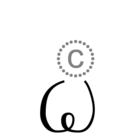Tha (Javanese)
ꦛ is one of syllable in Javanese script that represent the sound /ʈɔ/, /ʈa/. It is transliterated to Latin as "tha", and sometimes in Indonesian orthography as "tho". It has another form (pasangan), which is ◌꧀ꦛ, but represented by a single Unicode code point, U+A99B.[1][2][3]
- For a more general overview encompassing other Indic scripts, see Ṭa (Indic)
| ꦛ | |
| tha | |
| Aksara nglegena | Aksara pasangan |
|---|---|
 |  |
| Javanese script | |
| Latin orthography | tha |
| Phoneme | [ṭ] |
| Unicode | U+A99B |
Pasangan
It's pasangan form ◌꧀ꦛ, is located on the bottom side of the previous syllable.
Murda
The letter ꦛ doesn't have a murda form.
Mahaprana
Mahaprana letters were originally aspirated consonants used in Sanskrit and Kawi transliterations. However, there are no aspirated consonants in modern Javanese. The mahaprana form of ꦛ is ꦜ.
Glyphs
| Nglegena forms | Pasangan forms | ||||||
|---|---|---|---|---|---|---|---|
| ꦛ tha | ꦛꦃ thah | ꦛꦁ thang | ꦛꦂ thar | ◌꧀ꦛ -tha | ◌꧀ꦛꦃ -thah | ◌꧀ꦛꦁ -thang | ◌꧀ꦛꦂ -thar |
| ꦛꦺ the | ꦛꦺꦃ theh | ꦛꦺꦁ theng | ꦛꦺꦂ ther | ◌꧀ꦛꦺ -the | ◌꧀ꦛꦺꦃ -theh | ◌꧀ꦛꦺꦁ -theng | ◌꧀ꦛꦺꦂ -ther |
| ꦛꦼ thê | ꦛꦼꦃ thêh | ꦛꦼꦁ thêng | ꦛꦼꦂ thêr | ◌꧀ꦛꦼ -thê | ◌꧀ꦛꦼꦃ -thêh | ◌꧀ꦛꦼꦁ -thêng | ◌꧀ꦛꦼꦂ -thêr |
| ꦛꦶ thi | ꦛꦶꦃ thih | ꦛꦶꦁ thing | ꦛꦶꦂ thir | ◌꧀ꦛꦶ -thi | ◌꧀ꦛꦶꦃ -thih | ◌꧀ꦛꦶꦁ -thing | ◌꧀ꦛꦶꦂ -thir |
| ꦛꦺꦴ tho | ꦛꦺꦴꦃ thoh | ꦛꦺꦴꦁ thong | ꦛꦺꦴꦂ thor | ◌꧀ꦛꦺꦴ -tho | ◌꧀ꦛꦺꦴꦃ -thoh | ◌꧀ꦛꦺꦴꦁ -thong | ◌꧀ꦛꦺꦴꦂ -thor |
| ꦛꦸ thu | ꦛꦸꦃ thuh | ꦛꦸꦁ thung | ꦛꦸꦂ thur | ◌꧀ꦛꦸ -thu | ◌꧀ꦛꦸꦃ -thuh | ◌꧀ꦛꦸꦁ -thung | ◌꧀ꦛꦸꦂ -thur |
| ꦛꦿ thra | ꦛꦿꦃ thrah | ꦛꦿꦁ thrang | ꦛꦿꦂ thrar | ◌꧀ꦛꦿ -thra | ◌꧀ꦛꦿꦃ -thrah | ◌꧀ꦛꦿꦁ -thrang | ◌꧀ꦛꦿꦂ -thrar |
| ꦛꦿꦺ thre | ꦛꦿꦺꦃ threh | ꦛꦿꦺꦁ threng | ꦛꦿꦺꦂ threr | ◌꧀ꦛꦿꦺ -thre | ◌꧀ꦛꦿꦺꦃ -threh | ◌꧀ꦛꦿꦺꦁ -threng | ◌꧀ꦛꦿꦺꦂ -threr |
| ꦛꦽ thrê | ꦛꦽꦃ thrêh | ꦛꦽꦁ thrêng | ꦛꦽꦂ thrêr | ◌꧀ꦛꦽ -thrê | ◌꧀ꦛꦽꦃ -thrêh | ◌꧀ꦛꦽꦁ -thrêng | ◌꧀ꦛꦽꦂ -thrêr |
| ꦛꦿꦶ thri | ꦛꦿꦶꦃ thrih | ꦛꦿꦶꦁ thring | ꦛꦿꦶꦂ thrir | ◌꧀ꦛꦿꦶ -thri | ◌꧀ꦛꦿꦶꦃ -thrih | ◌꧀ꦛꦿꦶꦁ -thring | ◌꧀ꦛꦿꦶꦂ -thrir |
| ꦛꦿꦺꦴ thro | ꦛꦿꦺꦴꦃ throh | ꦛꦿꦺꦴꦁ throng | ꦛꦿꦺꦴꦂ thror | ◌꧀ꦛꦿꦺꦴ -thro | ◌꧀ꦛꦿꦺꦴꦃ -throh | ◌꧀ꦛꦿꦺꦴꦁ -throng | ◌꧀ꦛꦿꦺꦴꦂ -thror |
| ꦛꦿꦸ thru | ꦛꦿꦸꦃ thruh | ꦛꦿꦸꦁ thrung | ꦛꦿꦸꦂ thrur | ◌꧀ꦛꦿꦸ -thru | ◌꧀ꦛꦿꦸꦃ -thruh | ◌꧀ꦛꦿꦸꦁ -thrung | ◌꧀ꦛꦿꦸꦂ -thrur |
| ꦛꦾ thya | ꦛꦾꦃ thyah | ꦛꦾꦁ thyang | ꦛꦾꦂ thyar | ◌꧀ꦛꦾ -thya | ◌꧀ꦛꦾꦃ -thyah | ◌꧀ꦛꦾꦁ -thyang | ◌꧀ꦛꦾꦂ -thyar |
| ꦛꦾꦺ thye | ꦛꦾꦺꦃ thyeh | ꦛꦾꦺꦁ thyeng | ꦛꦾꦺꦂ thyer | ◌꧀ꦛꦾꦺ -thye | ◌꧀ꦛꦾꦺꦃ -thyeh | ◌꧀ꦛꦾꦺꦁ -thyeng | ◌꧀ꦛꦾꦺꦂ -thyer |
| ꦛꦾꦼ thyê | ꦛꦾꦼꦃ thyêh | ꦛꦾꦼꦁ thyêng | ꦛꦾꦼꦂ thyêr | ◌꧀ꦛꦾꦼ -thyê | ◌꧀ꦛꦾꦼꦃ -thyêh | ◌꧀ꦛꦾꦼꦁ -thyêng | ◌꧀ꦛꦾꦼꦂ -thyêr |
| ꦛꦾꦶ thyi | ꦛꦾꦶꦃ thyih | ꦛꦾꦶꦁ thying | ꦛꦾꦶꦂ thyir | ◌꧀ꦛꦾꦶ -thyi | ◌꧀ꦛꦾꦶꦃ -thyih | ◌꧀ꦛꦾꦶꦁ -thying | ◌꧀ꦛꦾꦶꦂ -thyir |
| ꦛꦾꦺꦴ thyo | ꦛꦾꦺꦴꦃ thyoh | ꦛꦾꦺꦴꦁ thyong | ꦛꦾꦺꦴꦂ thyor | ◌꧀ꦛꦾꦺꦴ -thyo | ◌꧀ꦛꦾꦺꦴꦃ -thyoh | ◌꧀ꦛꦾꦺꦴꦁ -thyong | ◌꧀ꦛꦾꦺꦴꦂ -thyor |
| ꦛꦾꦸ thyu | ꦛꦾꦸꦃ thyuh | ꦛꦾꦸꦁ thyung | ꦛꦾꦸꦂ thyur | ◌꧀ꦛꦾꦸ -thyu | ◌꧀ꦛꦾꦸꦃ -thyuh | ◌꧀ꦛꦾꦸꦁ -thyung | ◌꧀ꦛꦾꦸꦂ -thyur |
Unicode block
Javanese script was added to the Unicode Standard in October, 2009 with the release of version 5.2.
| Javanese[1][2] Official Unicode Consortium code chart (PDF) | ||||||||||||||||
| 0 | 1 | 2 | 3 | 4 | 5 | 6 | 7 | 8 | 9 | A | B | C | D | E | F | |
| U+A98x | ꦀ | ꦁ | ꦂ | ꦃ | ꦄ | ꦅ | ꦆ | ꦇ | ꦈ | ꦉ | ꦊ | ꦋ | ꦌ | ꦍ | ꦎ | ꦏ |
| U+A99x | ꦐ | ꦑ | ꦒ | ꦓ | ꦔ | ꦕ | ꦖ | ꦗ | ꦘ | ꦙ | ꦚ | ꦛ | ꦜ | ꦝ | ꦞ | ꦟ |
| U+A9Ax | ꦠ | ꦡ | ꦢ | ꦣ | ꦤ | ꦥ | ꦦ | ꦧ | ꦨ | ꦩ | ꦪ | ꦫ | ꦬ | ꦭ | ꦮ | ꦯ |
| U+A9Bx | ꦰ | ꦱ | ꦲ | ꦳ | ꦴ | ꦵ | ꦶ | ꦷ | ꦸ | ꦹ | ꦺ | ꦻ | ꦼ | ꦽ | ꦾ | ꦿ |
| U+A9Cx | ꧀ | ꧁ | ꧂ | ꧃ | ꧄ | ꧅ | ꧆ | ꧇ | ꧈ | ꧉ | ꧊ | ꧋ | ꧌ | ꧍ | ꧏ | |
| U+A9Dx | ꧐ | ꧑ | ꧒ | ꧓ | ꧔ | ꧕ | ꧖ | ꧗ | ꧘ | ꧙ | ꧞ | ꧟ | ||||
| Notes | ||||||||||||||||
gollark: What could POSSIBLY go wrong?!
gollark: `math.randomseed` works as usual in potatOS, *but* before any user code executes potatOS generates a random number and seeds the generator with that if the uninstall challenge is started.
gollark: Yep!
gollark: * insanity
gollark: Galaxtone, you really shouldn't have incited this instanity.
References
- Campbell, George L. Compendium of the World's Languages. Vol. 1. New York: Routledge, 2000.
- Soemarmo, Marmo. "Javanese Script." Ohio Working Papers in Linguistics and Language Teaching 14.Winter (1995): 69-103.
- Daniels, Peter T and William Bright. The World's Writing Systems. Ed. Peter T Daniels and William Bright. New York: Oxford University Press, 1996.
This article is issued from Wikipedia. The text is licensed under Creative Commons - Attribution - Sharealike. Additional terms may apply for the media files.